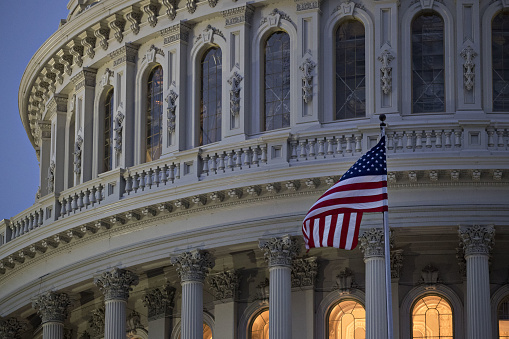Robert Mueller is special counsel no more. And he says he’ll have no comment beyond the report he released in April on his 2-year investigation of Russian meddling in the 2016 election, or possible obstruction of justice by President Trump.
He underscored the fact that his investigation did not clear the president.
“If we had had confidence that the president clearly did not commit a crime, we would have said so,” Mueller said. “We did not however make a determination as to whether the president did commit a crime.”
Mueller also said that charging Trump with a crime was never an option.
Trump, as he has in the past, ignored Mueller’s meaning and claimed innocence.
Mueller said the Constitution “requires a process other than the criminal justice system to formally accuse the president of wrongdoing,” indicating it’s now up to Congress to decide whether to forge ahead with an impeachment inquiry.
Top Democrats got the message.
The one Republican member of Congress who has openly supported impeachment was quick to weigh in.
But House Speaker Nancy Pelosi (D-CA) “has repeatedly said she doesn’t think impeaching Trump is a worthwhile effort, barring dramatic new evidence or the president’s continued efforts to stonewalls their investigations,” says Politico, although she recently accused him of a “cover-up” by not cooperating with Congress.
Mueller opened his statement by announcing his retirement from the Justice Department “to return to private life,” adding that the special counsel’s office is formally closing.
He said he chose to speak out at this time “because our investigation is complete,” insisting that he’ll have no further comment, beyond the report released in April on his 2-year investigation of Russian meddling in the 2016 election and of possible obstruction of justice by President Trump.
As for a potential appearance before Congress, Mueller made it clear he is reluctant to do so, declaring: “The report is my testimony.” He added that he and his team “chose those words carefully, and the work speaks for itself.”
He said that if he were to testify to lawmakers he would not go beyond what’s in the 448-page, 2-volume report. But it seems likely he’ll be summoned anyway.
Shortly after Mueller finished his statement, reports the Washington Post, an unnamed “House Democratic leadership aide” said “they were hoping to avoid a compulsory measure to get his testimony, but a subpoena remains an option.”
Mueller reviewed how and why the special counsel’s office was created: to investigate Russia’s interference in the election, noting that Russian military intelligence officers “launched a concerted attack on our political system,” hacking into computers used by the Clinton campaign.
“They stole private information, and then released that information through fake online identities and through the organization WikiLeaks. The releases were designed and timed to interfere with our election and to damage a presidential candidate [Clinton].”
At the end of his statement, Mueller underscored that point:
“I will close by reiterating the central allegation of our indictments — that there were multiple, systematic efforts to interfere in our election.
“That allegation deserves the attention of every American.”
Mueller noted that the order appointing him special counsel also authorized him and his team “to investigate actions that could obstruct the investigation,” which put the focus on Trump and his associates. Such matters, he said, are “of paramount importance.”
While Attorney General William Barr “has seemed to question why the special counsel investigated the president’s behavior, Mr. Mueller stressed the gravity of that inquiry,” says the New York Times.
“When a subject of an investigation obstructs that investigation or lies to investigators, it strikes at the core of their government’s effort to find the truth and hold wrongdoers accountable,” Mueller said.
The Post reports that what it calls Mueller’s “non-decision” regarding obstruction of justice “has roiled Washington — with Trump declaring complete vindication even as hundreds of former federal prosecutors say that Mueller laid out sufficient evidence in his report to make an obstruction case.”
Mueller said written Justice Department policy “explicitly permits the investigation of a sitting president, because it is important to preserve evidence while memories are fresh and documents are available.”
But that policy also holds that a president “cannot be charged with a federal crime while he is in office. That is unconstitutional. Even if the charge is kept under seal and hidden from public view, that, too, is prohibited,” he said.
In addition to the department policy, Mueller said, “we were guided by principles of fairness. It would be unfair to potentially accuse somebody of a crime when there can be no court resolution of an actual charge.”
He said neither he nor members of his team will comment on “other conclusions or hypotheticals about the president.”
Mueller took no questions from reporters.



